30 Apr 2014 | Egypt, Iraq, News and features, Nigeria, Pakistan, Religion and Culture, Syria, Tajikistan, Turkmenistan, Vietnam
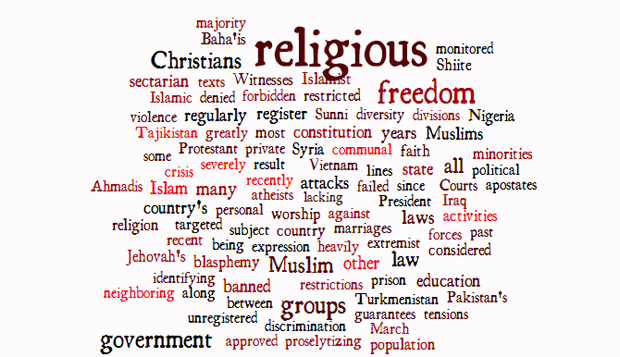
In January, Index summarised the U.S. State Department’s “Countries of Particular Concern” — those that severely violate religious freedom rights within their borders. This list has remained static since 2006 and includes Burma, China, Eritrea, Iran, North Korea, Saudi Arabia, Sudan, and Uzbekistan. These countries not only suppress religious expression, they systematically torture and detain people who cross political and social red lines around faith.
Today the U.S. Commission on International Religious Freedom (USCIRF), an independent watchdog panel created by Congress to review international religious freedom conditions, released its 15th annual report recommending that the State Department double its list of worst offenders to include Egypt, Iraq, Nigeria, Pakistan, Tajikistan, Turkmenistan, Vietnam and Syria.
Here’s a roundup of the systematic, ongoing and egregious religious freedom violations unfolding in each.
1. Egypt
The promise of religious freedom that came with a revised constitution and ousted Islamist president last year has yet to transpire. An increasing number of dissident Sunnis, Coptic Christians, Shiite Muslims, atheists and other religious minorities are being arrested for “ridiculing or insulting heavenly religions or inciting sectarian strife” under the country’s blasphemy law. Attacks against these groups are seldom investigated. Freedom of belief is theoretically “absolute” in the new constitution approved in January, but only for Muslims, Christians and Jews. Baha’is are considered apostates, denied state identity cards and banned from engaging in public religious activities, as are Jehovah’s Witnesses. Egyptian courts sentenced 529 Islamist supporters to death in March and another 683 in April, though most of the March sentences have been commuted to life in prison. Courts also recently upheld the five-year prison sentence of writer Karam Saber, who allegedly committed blasphemy in his work.
2. Iraq
Iraq’s constitution guarantees religious freedom, but the government has largely failed to prevent religiously-motivated sectarian attacks. About two-thirds of Iraqi residents identify as Shiite and one-third as Sunni. Christians, Yezidis, Sabean-Mandaeans and other faith groups are dwindling as these minorities and atheists flee the country amid discrimination, persecution and fear. Baha’is, long considered apostates, are banned, as are followers of Wahhabism. Sunni-Shia tensions have been exacerbated recently by the crisis in neighboring Syria and extremist attacks against religious pilgrims on religious holidays. A proposed personal status law favoring Shiism is expected to deepen divisions if passed and has been heavily criticized for allowing girls to marry as young as nine.
3. Nigeria
Nigeria is roughly divided north-south between Islam and Christianity with a sprinkling of indigenous faiths throughout. Sectarian tensions along these geographic lines are further complicated by ethnic, political and economic divisions. Laws in Nigeria protect religious freedom, but rule of law is severely lacking. As a result, the government has failed to stop Islamist group Boko Haram from terrorizing and methodically slaughtering Christians and Muslim critics. An estimated 16,000 people have been killed and many houses of worship destroyed in the past 15 years as a result of violence between Christians and Muslims. The vast majority of these crimes have gone unpunished. Christians in Muslim-majority northern states regularly complain of discrimination in the spheres of education, employment, land ownership and media.
4. Pakistan
Pakistan’s record on religious freedom is dismal. Harsh anti-blasphemy laws are regularly evoked to settle personal and communal scores. Although no one has been executed for blasphemy in the past 25 years, dozens charged with the crime have fallen victim to vigilantism with impunity. Violent extremists from among Pakistan’s Taliban and Sunni Muslim majority regularly target the country’s many religious minorities, which include Shiites, Sufis, Christians, Hindus, Zoroastrians, Sikhs, Buddhists and Baha’is. Ahmadis are considered heretics and are prevented from identifying as Muslim, as the case of British Ahmadi Masud Ahmad made all too clear in recent months. Ahmadis are politically disenfranchised and Hindu marriages are not state-recognized. Laws must be consistent with Islam, the state religion, and freedom of expression is constitutionally “subject to any reasonable restrictions imposed by law in the interest of the glory of Islam,” fostering a culture of self-censorship.
5. Tajikistan
Religious freedom has rapidly deteriorated since Tajikistan’s 2009 religion law severely curtailed free exercise. Muslims, who represent 90 percent of the population, are heavily monitored and restricted in terms of education, dress, pilgrimage participation, imam selection and sermon content. All religious groups must register with the government. Proselytizing and private religious education are forbidden, minors are banned from participating in most religious activities and Muslim women face many restrictions on communal worship. Jehovah’s Witnesses have been banned from the country since 2007 for their conscientious objection to military service, as have several other religious groups. Hundreds of unregistered mosques have been closed in recent years, and “inappropriate” religious texts are regularly confiscated.
6. Turkmenistan
The religious freedom situation in Turkmenistan is similar to that of Tajikistan but worse due to the country’s extraordinary political isolation and government repression. Turkmenistan’s constitution guarantees religious freedom, but many laws, most notably the 2003 religion law, contradict these provisions. All religious organizations must register with the government and remain subject to raids and harassment even if approved. Shiite Muslim groups, Protestant groups and Jehovah’s Witnesses have all had their registration applications denied in recent years. Private worship is forbidden and foreign travel for pilgrimages and religious education are greatly restricted. The government hires and fires clergy, censors religious texts, and fines and imprisons believers for their convictions.
7. Vietnam
Vietnam’s government uses vague national security laws to suppress religious freedom and freedom of expression as a means of maintaining its authority and control. A 2005 decree warns that “abuse” of religious freedom “to undermine the country’s peace, independence, and unity” is illegal and that religious activities must not “negatively affect the cultural traditions of the nation.” Religious diversity is high in Vietnam, with half the population claiming some form of Buddhism and the rest identifying as Catholic, Hoa Hao, Cao Dai, Protestant, Muslim or with other small faith and non-religious communities. Religious groups that register with the government are allowed to grow but are closely monitored by specialized police forces, who employ violence and intimidation to repress unregistered groups.
8. Syria
The ongoing Syrian crisis is now being fought along sectarian lines, greatly diminishing religious freedom in the country. President Bashar al-Assad’s forces, aligned with Hezbollah and Shabiha, have targeted Syria’s majority-Sunni Muslim population with religiously-divisive rhetoric and attacks. Extremist groups on the other side, including al-Qaeda and the Islamic State of Iraq and the Levant (ISIL), have targeted Christians and Alawites in their fight for an Islamic state devoid of religious tolerance or diversity. Many Syrians choose their allegiances based on their families’ faith in order to survive. It’s important to note that all human rights, not just religious freedom, are suffering in Syria and in neighboring refugee camps. In quieter times, proselytizing, conversion from Islam and some interfaith marriages are restricted, and all religious groups must officially register with the government.
This article was originally posted on April 30, 2014 at Religion News Service
21 Feb 2014 | Azerbaijan News, News and features

Azerbaijani Radio Free Europe/Radio Liberty journalist Khadija Ismayilova has been questioned by authorities three times over the past week, over allegations that she handed over state secrets to the US.
Ismayilova — an award-winning investigative journalist, who has in the past been blackmailed for her coverage of government corruption — was called first called in for questioning by the country’s General Prosecutor on 18 September. This came “after pro-government media outlets claimed that she had handed files on Azerbaijani opposition politicians and other prominent figures over to the aides, who were allegedly working as US intelligence agents,” reports RFE/RL.
She believes it was due to a dinner she had with US senate staffers in January. “The prosecutor in charge of my case told me that they have information that I passed some kind of state secrets to visiting Americans. I told them it is impossible, since I don’t have any state secrets in my possession. This is an absurd allegation,” she said.
Fearing she might get arrested, she posted the following message on Facebook on Wednesday:
Things get more complicated here. So there are couple things I want to ask for:
TO INTERNATIONAL HUMAN RIGHTS ACTIVISTS
You are doing everything right. Keep doing it.
TO DEMOCRATIC COUNTRIES, DIPLOMATS, INTERNATIONAL ORGANIZATIONS
Just in case, I want to remind my request to international community in terms of possible advocacy actions regarding my possible arrest:
Some of you want to help, but can do it only with private diplomacy.
Thank you, but No.
WHEN MY CASE IS CONCERNED, if you can, please support by standing for freedom of speech and freedom of privacy in this country as loudly as possible. Otherwise, I rather prefer you not to act at all.
I don’t want any private diplomacy for my case. I don’t believe in human rights advocacy behind closed doors. People of my country need to know that human rights are supported.
I also don’t want any release-appreciation trade for my release. My possible arrest will be just one of the more than hundred politically motivated arrest and government of Azerbaijan has managed to use revolving doors of prisons for getting positive feedback from the West: releasing one prisoner, getting praised, arresting two.
TO FELLOW INTERNATIONAL JOURNALISTS
IF/WHEN I get arrested, I want you to make sure that your audience understand the reasons. Anti-corruption investigations are the reason of my arrest. The government is not comfortable with what I am doing. I am about to finish three investigations. I will make sure to finish them before anything happens, if not my editors and colleagues will finish and publish.
İnvestigations I am working on are on the same topic:
SELECTED REPORTS AND INVESTIGATIONS
Latest report (in Azeri) is about Czech company of Arzu Aliyeva, president’s daughter. The company is sold to tax minister’s advisor. Law bans officials from owning businesses and it is not clear where the 1,2 millions EUros are taken?
http://www.azadliq.org/content/article/25232145.html
2012 President awarded family stake in gold fields
Lucrative gold mining contract signed in 2007 with unknown companies is about to bring millions to it’s secret owners. Khadija Ismayilova and Nushaba Fatullayeva discover familiar names hidden behind offshore companies. Azerbaijani President’s daughters are among beneficiaries.
http://reportingproject.net/occrp/index.php/en/ccwatch/cc-watch-indepth/1495-azerbaijans-president-awarded-family-stake-in-gold-fields
2012 President’s family has a stake in Eurovision concert hall
Azerbaijan spends hundreds of millions to host Eurovision contest, with more than a hundred millions of public funds invested into the concert hall. Khadija Ismayilova’s investigation traces one of the subcontractors, involved to the expensive project and finds a link to the president’s family. The same company is involved into construction of state funded “patriot” project in 2010– the highest flagpole in the world (which became second highest after Tajikistan beat the record few months later) and shady privatization of energy construction facilities.
http://reportingproject.net/occrp/index.php/en/ccwatch/cc-watch-indepth/1499-presidents-family-benefits-from-eurovision-hall
2011 Tracking the President’s family business
For more than five years government of Azerbaijan lied to citizens about ownership of the mobile phone operator, naming German Siemens as an owner of Azerfon company, enjoying favorable conditions in the market, not available for competitors. The investigation reveals that president Aliyev’s daughters were behind Azerfon through shell companies in Panama.http://www.rferl.org/content/azerbaijan_president_aliyev_daughters_tied_to_telecoms_firm/24248340.html
2010 President Aliyev’s family and the illegal privatization of the public airport
The investigation conducted with Ulviyya Asadzade documented how President IlhamAliyev’s family was involved in the illegal privatization of the public bank and other parts of state owned Azerbaijan Airlines company, to benefit the Aliyev family. The government never publicly announced the privatization. The report was declared “the best investigation of Radio Free Europe Radio Liberty in 2010” among the 28 language services of the radio.http://www.rferl.org/content/Aliyevs_Azerbaijani_Empire_Grows_As_Daughter_Joins_The_Game/2127137.html
Today, she also used her Facebook page to call attention to a number of other attacks on press freedom in the past week. Ilgar Veliyev, a journalists with axar.az, resigned from his post following the website’s “smear campaign” against Ismayilova. Natiq Cavadli was fired from Bizim Yol newspaper after publishing an interview with an economics expert who has “revealed corruption in customs”, and Ayten Farhadova resigned from the same paper in solidarity. Yafez Hasanov from RFE/RL has received death threats in connection with his reporting on human rights violations in in Nakhchivan Autonomous Republic of Azerbaijan.
The state of press freedom in Azerbaijan is notably poor. An Index on Censorship report released in connection with the country’s recent presidential election highlighted the ongoing “clampdown on independent and critical media”.
This article was posted on 21 February 2014 at indexoncensorship.org
7 Feb 2014 | Europe and Central Asia, News and features, Russia
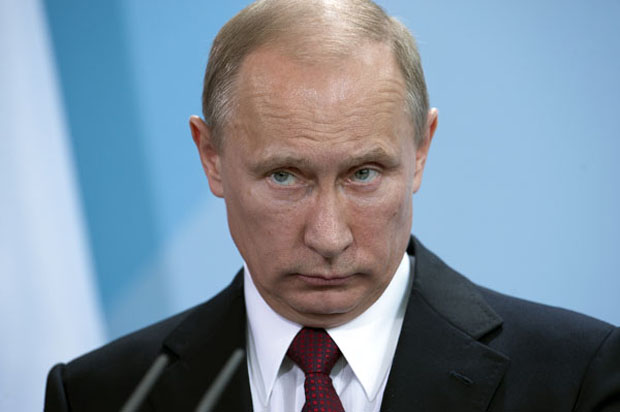
(Image: Gonçalo Silva/Demotix)
The Sochi Winter Olympics opening ceremony is taking place today, and organisers have declared that a record 65 world leaders are attending. But numbers alone don’t tell the whole story. As it turns out, some of the biggest names in global politics will not be in the stands cheer on their athletes as the games are officially kick off. Indeed, quite a few won’t be taking the trip to Sochi at all. Barack Obama is sending a delegation including openly gay figure skater Brian Boitano in his place, and Angela Merkel, David Cameron and Francois Hollande are also staying away.
But while the International Olympic Committee’s Thomas Bach was less than impressed by the apparent boycott, labelling it an “ostentatious gesture” that “costs nothing but makes international headlines”, the absence of the big guns does give the lesser-known world leaders a chance to shine. Not all guests have been confirmed, but we’ve got the low-down on some of the the leaders the cameras might pan to during today’s festivities, or who could be spotted in the slopes over the coming weeks.
Alexander Lukashenko
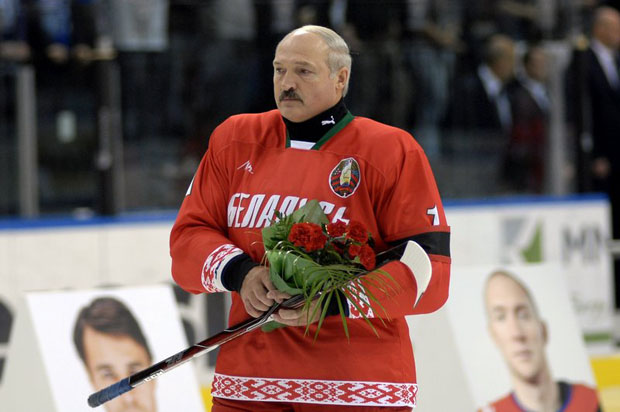
(Image: Ivan Uralsky/Demotix)
Putin’s long time colleague and fellow ice hockey enthusiast surely wouldn’t miss the Winter Olympics for the world. The Belarusian president is known as “the last dictator in Europe”, his near 20 years in power having passed without a single free and fair election. Under his leadership, peaceful protests have been violently dispersed, and civil society activists and political opposition — including rival candidates from the 2010 presidential elections — have been jailed. A brand new report from Index also concludes that: “Belarus continues to have one of the most restrictive and hostile media environments in Europe.”
Recep Tayyip Erdoğan

(Image: Philip Janek / Demotix)
The Turkish president made global headlines last summer, over his regime’s violent crackdown on the peaceful Gezi park demonstrations. Rather than accepting the protests were a manifestation of genuine grievances by his people, he blamed “foreign hands” and their “domestic collaborators” like many a less-than-democratic leader before him. His government was recently implicated in a big corruption scandal, and only yesterday, parliament approved controversial amendments to the country’s internet law. The new law, opposed by civil society, the opposition and international organisations alike, gives the government wide-reaching powers over the internet, effectively allowing them to block websites without court rulings, and gives them access to user data.
Viktor Yanukovych
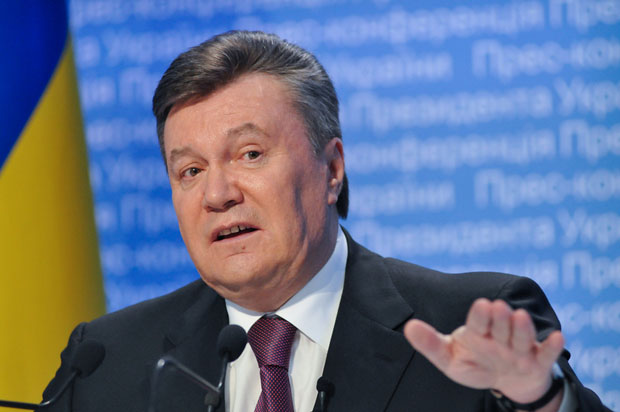
(Image: Oleksandr Nazarov/Demotix)
The Ukrainian president’s failure to sign a treaty securing closer ties with the EU in November, sparked the country’s ongoing Euromaidan protests. The authorities response was heavy handed — police clashed with demonstrators and journalist were targeted, leading to international condemnation. They authorities even briefly implemented a highly repressive new law, among other things allowing security services to monitor the internet, and defining NGOs receiving funding from abroad as “foreign agents”. The law was, however, scrapped only days later following outrage from civil society. Meanwhile,Ukraine’s Prime Minister and government also stepped down, while Yanukovych took four days off ill. He’s back in the office now — just in time head to Sochi for a much-hyped meeting with Putin.
Nursultan Nazarbayev
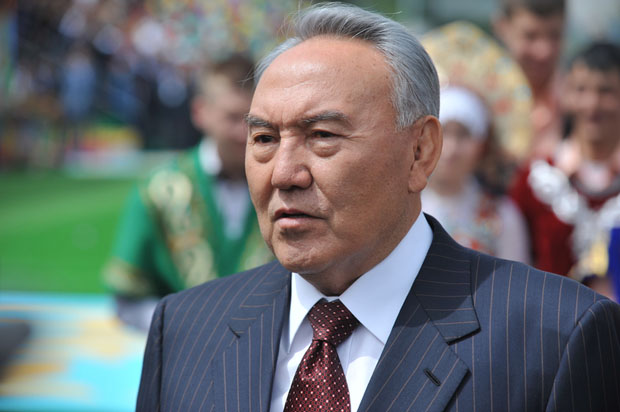
(Image: Vladimir Tretyakov/Demotix)
Kazakhstan’s president has been in power since 1991, and during that time, allegations of human rights abuses, including attacks on demonstrators and independent media, as well as widespread corruption have been regularly levelled at him. In 2012, following clashed between the police and striking workers, the president, who already effectively controls the legislature and the judiciary, further extended his emergency powers. But Putin wouldn’t even be his only high-flying friend. In September, Kanye West performed at his grandson’s wedding. The reported price tag? $3 million. Did I mention the accusations of corruption? Meanwhile, former British prime minister Tony Blair spent two years advising Nazarbayev and his government on democracy and good governance — a deal which “produced no change for the better or advance of democratic rights in the authoritarian nation”.
Emomali Rahmon
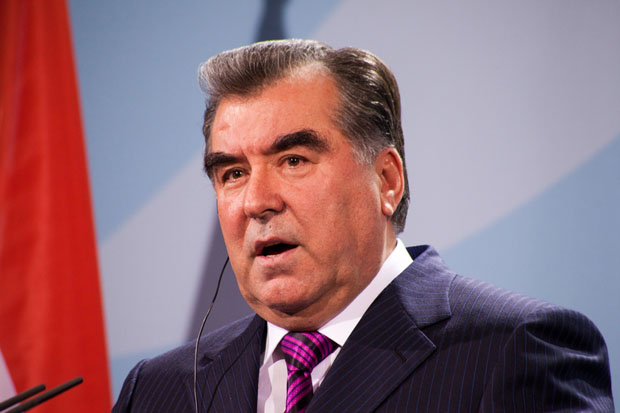
(Image: Riccardo Valsecchi/Demotix)
He has been the head of the government of Tajikistan since 1992, and was in power during the country’s civil war, where 100,000 people lost their lives. Allegations of human rights abuses, including torture by security forces and arbitrary arrests, are widespread. Much of the media is state-controlled, and independent journalists face violence and intimidation. “Publicly insulting the president” can see you jailed for as long as five years. Recently, a prominent member of the opposition, Zaid Saidov, was sentenced to 26 years in prison following what has been described as a “politically motivated trial”. In Sochi, he is set to meet with not only Putin, but also Chinese leader Xi Jinping.
This article was posted on February 7 2014 at indexoncensorship.org
15 Jan 2014 | Europe and Central Asia, European Union, Index Reports, News and features, Politics and Society
This article is part of a series based on our report, Time to Step Up: The EU and freedom of expression
Beyond its near neighbourhood, the EU works to promote freedom of expression in the wider world. To promote freedom of expression and other human rights, the EU has 30 ongoing human rights dialogues with supranational bodies, but also large economic powers such as China.
The EU and freedom of expression in China
The focus of the EU’s relationship with China has been primarily on economic development and trade cooperation. Within China some commentators believe that the tough public noises made by the institutions of the EU to the Chinese government raising concerns over human rights violations are a cynical ploy so that EU nations can continue to put financial interests first as they invest and develop trade with the country. It is certainly the case that the member states place different levels of importance on human rights in their bilateral relationships with China than they do in their relations with Italy, Portugal, Romania and Latvia. With China, member states are often slow to push the importance of human rights in their dialogue with the country. The institutions of the European Union, on the other hand, have formalised a human rights dialogue with China, albeit with little in the way of tangible results.
The EU has a Strategic Partnership with China. This partnership includes a political dialogue on human rights and freedom of the media on a reciprocal basis.[1] It is difficult to see how effective this dialogue is and whether in its present form it should continue. The EU-China human rights dialogue, now 14 years old, has delivered no tangible results.The EU-China Country Strategic Paper (CSP) 2007-2013 on the European Commission’s strategy, budget and priorities for spending aid in China only refers broadly to “human rights”. Neither human rights nor access to freedom of expression are EU priorities in the latest Multiannual Indicative Programme and no money is allocated to programmes to promote freedom of expression in China. The CSP also contains concerning statements such as the following:
“Despite these restrictions [to human rights], most people in China now enjoy greater freedom than at any other time in the past century, and their opportunities in society have increased in many ways.”[2]
Even though the dialogues have not been effective, the institutions of the EU have become more vocal on human rights violations in China in recent years. For instance, it included human rights defenders, including Ai Weiwei, at the EU Nobel Prize event in Beijing. The Chinese foreign ministry responded by throwing an early New Year’s banquet the same evening to reduce the number of attendees to the EU event. When Ai Weiwei was arrested in 2011, the High Representative for Foreign Affairs Catherine Ashton issued a statement in which she expressed her concerns at the deterioration of the human rights situation in China and called for the unconditional release of all political prisoners detained for exercising their right to freedom of expression.[3] The European Parliament has also recently been vocal in supporting human rights in China. In December 2012, it adopted a resolution in which MEPs denounced the repression of “the exercise of the rights to freedom of expression, association and assembly, press freedom and the right to join a trade union” in China. They criticised new laws that facilitate “the control and censorship of the internet by Chinese authorities”, concluding that “there is therefore no longer any real limit on censorship or persecution”. Broadly, within human rights groups there are concerns that the situation regarding human rights in China is less on the agenda at international bodies such as the Human Rights Council[4] than it should be for a country with nearly 20% of the world’s population, feeding a perception that China seems “untouchable”. In a report on China and the International Human Rights System, Chatham House quotes a senior European diplomat in Geneva, who argues “no one would dare” table a resolution on China at the HRC with another diplomat, adding the Chinese government has “managed to dissuade states from action – now people don’t even raise it”. A small number of diplomats have expressed the view that more should be done to increase the focus on China in the Council, especially given the perceived ineffectiveness of the bilateral human rights dialogues. While EU member states have shied away from direct condemnation of China, they have raised freedom of expression abuses during HRC General Debates.
The Common Foreign and Security Policy and human rights dialogues
The EU’s Common Foreign and Security Policy (CFSP) is the agreed foreign policy of the European Union. The Maastricht Treaty of 1993 allowed the EU to develop this policy, which is mandated through Article 21 of the Treaty of the European Union to protect the security of the EU, promote peace, international security and co-operation and to consolidate democracy, the rule of law and respect for human rights and fundamental freedom. Unlike most EU policies, the CFSP is subject to unanimous consensus, with majority voting only applying to the implementation of policies already agreed by all member states. As member states still value their own independent foreign policies, the CFSP remains relatively weak, and so a policy that effectively and unanimously protects and promotes rights is at best still a work in progress. The policies that are agreed as part of the Common Foreign and Security Policy therefore be useful in protecting and defending human rights if implemented with support. There are two key parts of the CFSP strategy to promote freedom of expression, the External Action Service guidelines on freedom of expression and the human rights dialogues. The latter has been of variable effectiveness, and so civil society has higher hopes for the effectiveness of the former.
The External Action Service freedom of expression guidelines
As part of its 2012 Action Plan on Human Rights and Democracy, the EU is working on new guidelines for online and offline freedom of expression, due by the end of 2013. These guidelines could provide the basis for more active external policies and perhaps encourage a more strategic approach to the promotion of human rights in light of the criticism made of the human rights dialogues.
The guidelines will be of particular use when the EU makes human rights impact assessments of third countries and in determining conditionality on trade and aid with non-EU states. A draft of the guidelines has been published, but as these guidelines will be a Common Foreign and Security Policy document, there will be no full and open consultation for civil society to comment on the draft. This is unfortunate and somewhat ironic given the guidelines’ focus on free expression. The Council should open this process to wider debate and discussion.
The draft guidelines place too much emphasis on the rights of the media and not enough emphasis on the role of ordinary citizens and their ability to exercise the right to free speech. It is important the guidelines deal with a number of pressing international threats to freedom of expression, including state surveillance, the impact of criminal defamation, restrictions on the registration of associations and public protest and impunity against human right defenders. Although externally facing, the freedom of expression guidelines may also be useful in indirectly establishing benchmarks for internal EU policies. It would clearly undermine the impact of the guidelines on third parties if the domestic policies of EU member states contradict the EU’s external guidelines.
Human rights dialogues
Another one of the key processes for the EU to raise concerns over states’ infringement of the right to freedom of expression as part of the CFSP are the human rights dialogues. The guidelines on the dialogues make explicit reference to the promotion of freedom of expression. The EU runs 30 human rights dialogues across the globe, with the key dialogues taking place in China (as above), Kazakhstan, Kyrgyzstan, Tajikistan, Turkmenistan, Uzbekistan, Georgia and Belarus. It also has a dialogues with the African Union, all enlargement candidate countries (Croatia, the former Yugoslav republic of Macedonia and Turkey), as well as consultations with Canada, Japan, New Zealand, the United States and Russia. The dialogue with Iran was suspended in 2006. Beyond this, there are also “local dialogues” at a lower level, with the Heads of EU missions, with Cambodia, Bangladesh, Egypt, India, Israel, Jordan, Laos, Lebanon, Morocco, Pakistan, the Palestinian Authority, Sri Lanka, Tunisia and Vietnam. In November 2008, the Council decided to initiate and enhance the EU human rights dialogues with a number of Latin American countries.
It is argued that because too many of the dialogues are held behind closed doors, with little civil society participation with only low-level EU officials, it has allowed the dialogues to lose their importance as a tool. Others contend that the dialogues allow the leaders of EU member states and Commissioners to silo human rights solely into the dialogues, giving them the opportunity to engage with authoritarian regimes on trade without raising specific human rights objections.
While in China and Central Asia the EU’s human rights dialogues have had little impact, elsewhere the dialogues are more welcome. The EU and Brazil established a Strategic Partnership in 2007. Within this framework, a Joint Action Plan (JAP) covering the period 2012-2014 was endorsed by the EU and Brazil, in which they both committed to “promoting human rights and democracy and upholding international justice”. To this end, Brazil and the EU hold regular human rights consultations that assess the main challenges concerning respect for human rights, democratic principles and the rule of law; advance human rights and democracy policy priorities and identify and coordinate policy positions on relevant issues in international fora. While at present, freedom of expression has not been prioritised as a key human rights challenge in this dialogue, the dialogues are seen by both partners as of mutual benefit. It is notable that in the EU-Brazil dialogue both partners come to the dialogues with different human rights concerns, but as democracies. With criticism of the effectiveness and openness of the dialogues, the EU should look again at how the dialogues fit into the overall strategy of the Union and its member states in the promotion of human rights with third countries and assess whether the dialogues can be improved.
[1] It covers both press freedom for the Chinese media in Europe and also press freedom for European media in China.
[2] China Strategy Paper 2007-2013, Annexes, ‘the political situation’, p. 11
[3] “I urge China to release all of those who have been detained for exercising their universally recognised right to freedom of expression.”
[4] Interview with European diplomat, February 2013.








